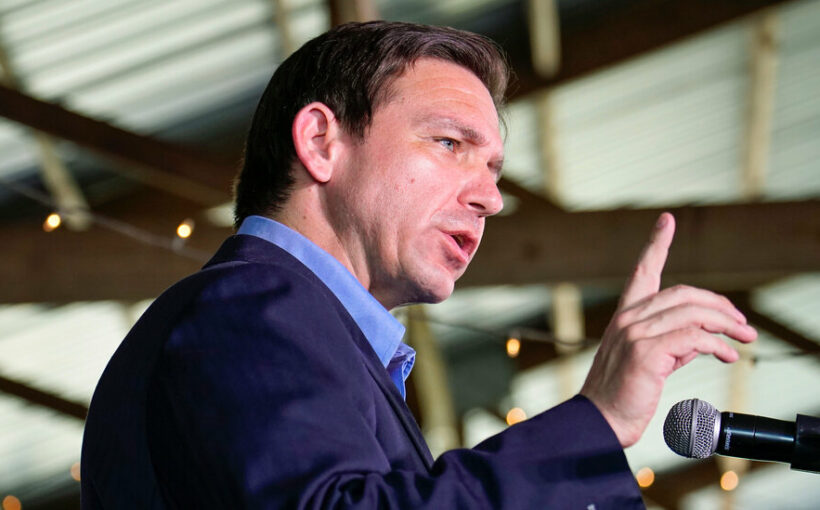As Gov. Ron DeSantis of Florida begins to aggressively attack former President Donald J. Trump, his campaign has spread three images of the former president embracing Dr. Anthony S. Fauci that forensic experts say are almost certainly realistic-looking “deepfakes” generated by artificial intelligence.
The images — which at first glance appear genuine and are interspersed with real photographs in a campaign video — show Mr. Trump hugging and kissing Dr. Fauci, who led the nation’s pandemic response and has been a target of harsh criticism from Mr. DeSantis. The governor has used the pandemic to contrast himself with his main rival for the Republican presidential nomination.
A Twitter account run by Mr. DeSantis’s campaign posted the images, part of a video attacking Mr. Trump, on Monday. The news agency Agence France-Presse first reported that they appeared fake on Wednesday.
The governor’s campaign did not respond to a request for comment.
Mr. Trump’s Republican allies criticized the DeSantis campaign on Thursday. Senator J.D. Vance of Ohio wrote on Twitter: “Smearing Donald Trump with fake AI images is completely unacceptable.” Representative Marjorie Taylor Green of Georgia agreed, saying: “Those fake AI campaign ads need to be taken down immediately.”
In turn, Mr. DeSantis’s camp suggested the images were obviously fake, comparing them to memes circulated by Mr. Trump and his allies. But those images — which included a video of Mr. DeSantis in a woman’s suit adapted from “The Office” and a “recording” of a conversation between Mr. DeSantis, Adolf Hitler and the Devil — were clearly intended to be humorous and easy to discern as doctored.
On Twitter, Christina Pushaw, the DeSantis campaign’s rapid response director, shared a fake photograph of Mr. DeSantis riding a rhinoceros (a reference to accusations that he is a “Republican in Name Only,” or RINO), writing: “I think this might be an AI-generated image. Who knows?” The image, which appeared to be photoshopped, had earlier been posted by Mr. Trump on his Truth Social website.
As the 2024 campaign heats up, the use of such deepfakes has been of urgent concern to those who study manipulated images, which thanks to new technology are easier to generate than ever before. While Americans have grown far more skeptical of reports in the print, digital and broadcast news media, experts said, they have been more likely to trust videos and images that they could examine with their own eyes. The advent of deepfakes could change that.
“This is the big information security problem of the 21st century,” said Matthew Stamm, an associate professor of electrical and computer engineering at Drexel University who reviewed the images of Mr. Trump and Dr. Fauci and strongly doubted their authenticity.
After President Biden announced he would seek re-election, the Republican National Committee released a video with A.I.-generated images, including of China invading Taiwan, claiming to depict a potential future if he were to win again in 2024. Unlike Mr. DeSantis’s video, the R.N.C. ad acknowledged, in small white characters at the top left of the screen, that it had been “built entirely with A.I. imagery.”
Hany Farid, a professor at the University of California, Berkeley, said the use of such tactics would only increase.
“We will continue to see campaigns, state-sponsored actors, trolls and people who want to sow chaos use these fake images to drive their own agendas,” said Mr. Farid, who also concluded that the images posted by the DeSantis campaign were most likely fake.
While he described the three images as “pretty clumsily done” — pointing to flaws in Mr. Trump’s hair and ear, as well as nonsensical lettering in what appeared to be a White House seal and an American flag with a bizarre pattern of stars — he said generative artificial intelligence was quickly growing more sophisticated. For instance, he said, the technology had already adapted to produce more authentic-looking hands, an early flaw in its realism.
“These are well-known signs that an A.I.-based synthetic image generator was likely used to create these images,” said Mr. Farid, who added that some experts were beginning to systemically review campaign materials for signs they contain deepfakes.
He said politicians would now have a ready-made excuse when genuine representations of their actions — such as Mr. Trump’s infamous “Access Hollywood” tape — appear in public.
“They have plausible deniability,” Mr. Farid said. “They can say it’s fake.”
Jonathan Swan and Shane Goldmacher contributed reporting.
Nicholas Nehamas is a campaign reporter, focusing on the emerging candidacy of Gov. Ron DeSantis of Florida. Before joining The Times in 2023, he worked for nine years at The Miami Herald, mainly as an investigative reporter. @NickNehamas
Source: Read Full Article
